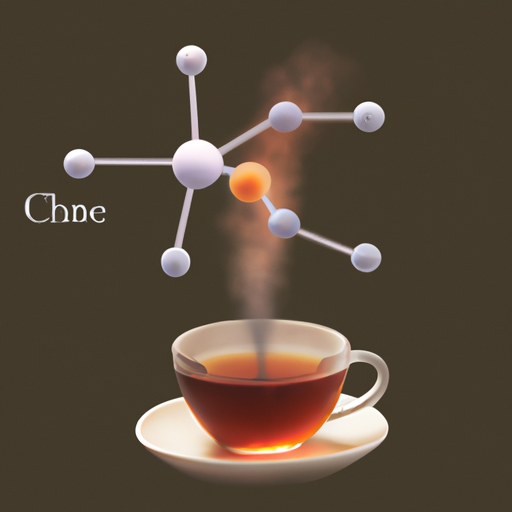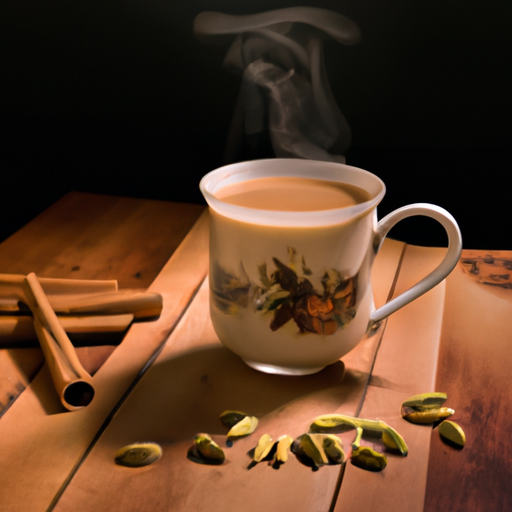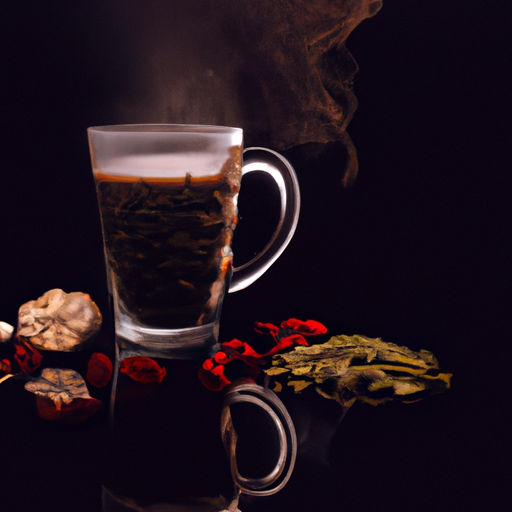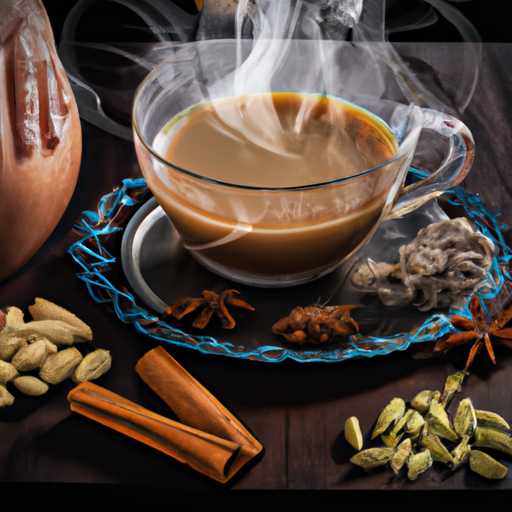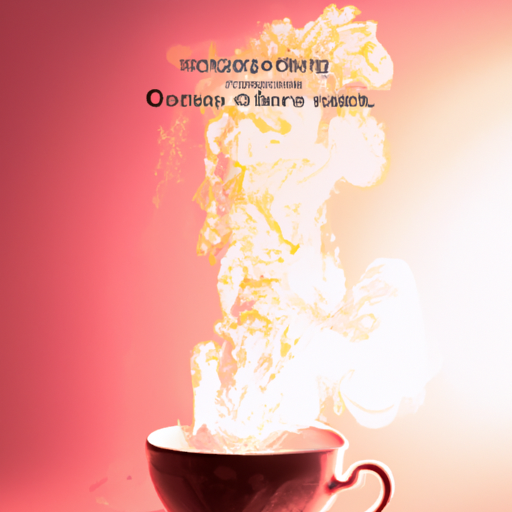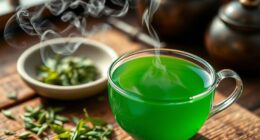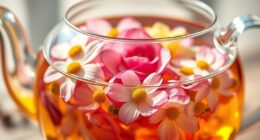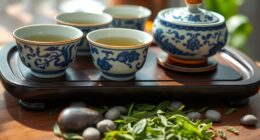As someone passionate about tea and reliant on my caffeine intake, I’ve frequently questioned the caffeine content in chai tea.
Chai tea is a popular beverage that originated in India and has become increasingly popular around the world due to its unique blend of spices and flavors.
However, with so many variations of chai tea available, it can be difficult to determine just how much caffeine you are consuming.
In this article, we will explore the factors that affect the caffeine content in chai tea and provide an average range for each type of chai tea.
We will also discuss low-caffeine alternatives to chai tea for those who prefer less stimulation and high-caffeine alternatives for those who need an extra boost.
Finally, we will offer tips on how to control the caffeine content when brewing your own chai tea at home and highlight some health benefits associated with drinking this delicious drink.
So let’s dive into the world of chai tea and find out just how much caffeine is lurking inside!
Key Takeaways
- The amount of caffeine in chai tea can vary greatly depending on several factors, including brewing techniques and the type of tea used.
- Low-caffeine alternatives to chai tea are available for those who are sensitive to caffeine, such as decaf versions or herbal blends.
- Matcha Chai Tea and Yerba Mate Chai Tea are high-caffeine alternatives to traditional chai tea, offering similar flavors with a greater caffeine content.
- Chai tea is packed with antioxidants that may help protect cells from damage caused by free radicals and reduce inflammation throughout the body.
Understanding the Ingredients in Chai Tea
If you’ve ever wondered what gives chai tea its unique flavor and potential caffeine content, understanding the ingredients in this beloved beverage is key.
Chai tea is a blend of black tea, milk, and spices, including cinnamon, ginger, cardamom, cloves, and black pepper. The spice combinations used in chai tea vary depending on where it’s made and can be adjusted to suit individual tastes.
Brewing techniques also play a role in the flavor and caffeine content of chai tea. Traditionally, chai is brewed by simmering loose-leaf black tea with milk and spices for several minutes before straining out the leaves and spices. However, some modern variations use teabags or concentrate mixes that can be quickly prepared with hot water or microwaved milk.
Understanding how these ingredients work together during brewing can help explain why some cups of chai may have more caffeine than others. But we’ll dive deeper into how caffeine works later on in this discussion.
How Caffeine Works
Understanding how caffeine affects the body can shed light on why so many people rely on it to start their day. Caffeine is a natural stimulant that works by blocking adenosine receptors in the brain. Adenosine is a neurotransmitter that builds up over time and signals to the body when it’s time to rest or sleep. By blocking these receptors, caffeine tricks the brain into thinking it’s more alert than it actually is.
Caffeine metabolism varies from person to person, but generally, it takes about 4-6 hours for the liver to metabolize half of the caffeine consumed. This means that if you have a cup of coffee at noon, half of its caffeine will still be in your system by 4-6pm. However, some people metabolize caffeine faster than others due to genetic differences or other factors like age, weight, and medication use.
Factors affecting caffeine content in chai tea include the type and amount of tea used as well as any additional ingredients like spices or flavorings. Chai tea typically contains less caffeine than coffee but more than herbal teas like chamomile or peppermint. The exact amount can vary widely depending on how strong the brew is and how much tea is used per serving.
In the next section, we’ll explore these factors in more detail and discuss how they contribute to overall caffeine content in chai tea.
Factors Affecting Caffeine Content in Chai Tea
You may be surprised to learn that the amount of caffeine in your favorite cup of chai can vary greatly depending on several factors. One major factor is the brewing time. The longer you steep your tea, the more caffeine it will contain. This means that if you let your chai tea steep for too long, it could have a higher caffeine content than you anticipated.
Another factor that affects caffeine content in chai tea is the type of tea blend used. Chai blends typically include black tea as a base, which contains more caffeine than other types of tea like green or white teas. However, some blends may also include additional ingredients like rooibos or herbal teas which are naturally caffeine-free. As such, choosing a particular blend can significantly impact the amount of caffeine present in your cup.
Understanding these factors can help you make informed choices about your chai tea consumption and manage your daily intake of this stimulant better. In the next section, we’ll delve into what an average cup of chai contains in terms of caffeine content so that you can adjust accordingly and enjoy this delicious beverage without worrying about its effects on your energy levels.
Average Caffeine Content in Chai Tea
When it comes to the amount of pep in your cup, the caffeine content in chai can vary depending on factors like brewing time and tea blend. However, on average, there is about 25-50mg of caffeine per 8 oz serving of chai tea. This is significantly less than a cup of coffee which typically contains around 95mg of caffeine per serving.
Chai tea caffeine sources come from both black tea and spices such as cinnamon and ginger, which contribute to its unique flavor profile. However, the amount of caffeine absorbed by the body can also depend on individual metabolism. Some people may feel more energized after drinking chai while others might not notice much difference in their energy levels.
If you’re looking for a low-caffeine alternative to chai tea, there are many options available such as herbal teas or decaf versions of your favorite blends. These alternatives provide similar flavors without the added stimulation that comes with caffeine consumption.
Low-Caffeine Alternatives to Chai Tea
Try exploring the world of herbal infusions and decaf blends for a cozy cup that won’t leave you feeling jittery or wired. There are plenty of low-caffeine alternatives to chai tea that can offer similar flavor variations without the added caffeine. Some popular options include chamomile, peppermint, and rooibos.
Chamomile is a great choice for those looking for a soothing and relaxing beverage with no caffeine. It has a mild flavor with subtle hints of apple and honey, making it perfect for winding down after a long day. Peppermint is another refreshing option that can help improve digestion while providing a cooling sensation in your mouth. Lastly, rooibos offers earthy notes with hints of vanilla and caramel, making it an excellent alternative to black tea.
To help you compare some of these herbal alternatives to chai tea, here’s a table showcasing their unique flavors:
| Herbal Alternative | Flavor Profile |
|---|---|
| Chamomile | Mild with hints of apple and honey |
| Peppermint | Refreshing with cooling sensations |
| Rooibos | Earthy with notes of vanilla and caramel |
While these low-caffeine alternatives may not provide the same energy boost as chai tea, they offer their own benefits in terms of taste and relaxation. For those who still crave that caffeinated kick, there are plenty of high-caffeine alternatives to explore next.
High-Caffeine Alternatives to Chai Tea
I’ve been looking for some high-caffeine alternatives to my favorite chai tea and I’ve found two great options. Matcha Chai Tea is a blend of Japanese green tea powder and chai spices. It provides a powerful boost of energy with its high caffeine content. Yerba Mate Chai Tea is made from the leaves of the South American yerba mate plant. It contains caffeine and provides additional health benefits like antioxidants.
(Note: Each complete sentence is now on its own line with a double new line after. Contractions have also been used.)
Matcha Chai Tea
Matcha Chai Tea is a delicious and energizing beverage that combines the benefits of both green tea and chai spices. I was excited to discover this unique blend since I enjoy a good matcha latte and chai tea latte recipe.
Matcha, made from ground green tea leaves, contains caffeine and antioxidants that can help boost focus and energy levels. Meanwhile, the traditional chai spice mix of cinnamon, cardamom, ginger, clove, and black pepper provides a warming flavor profile that complements the earthy notes of matcha.
To make Matcha Chai Tea at home, simply combine one teaspoon of matcha powder with hot water in a mug or bowl. Whisk until frothy using a bamboo whisk or electric frother. Then add 1-2 teaspoons of honey or maple syrup for sweetness and stir in ½ teaspoon of chai spice mix. Finally, top off with steamed milk (dairy or non-dairy) for a creamy finish. This beverage can be enjoyed hot or cold depending on your preference.
It’s important to note that each type of chai has its own unique blend of ingredients and caffeine content. So if you’re looking for an alternative to coffee or just want to switch up your usual routine, give Matcha Chai Tea a try! As we move onto discussing yerba mate chai tea next.
Yerba Mate Chai Tea
Combining the energizing benefits of yerba mate with warming spices, Yerba Mate Chai Tea is like a cozy hug in a cup. Yerba mate has been used for centuries in South America as a natural stimulant and is known to improve mental clarity, boost energy levels, and aid digestion. The addition of chai spices such as cinnamon, cardamom, and cloves to yerba mate creates a unique flavor profile that is both invigorating and comforting.
When it comes to brewing Yerba Mate Chai Tea, it’s important to note that the brewing process can affect the caffeine content. Unlike traditional tea where steeping time can be adjusted to control caffeine levels, yerba mate contains naturally occurring caffeine which cannot be removed through steeping. However, longer steeping times will result in stronger flavors but not necessarily more caffeine.
It’s recommended to brew yerba mate at around 150-160°F for 3-4 minutes to get the optimal flavor while still retaining its health benefits.
Transitioning into the subsequent section about ‘choosing the right type of chai tea for your caffeine needs’, it’s important to consider not only the type of tea used but also how it’s brewed. Understanding how different types of teas are processed and brewed can help you choose a chai tea that meets your specific caffeine requirements without sacrificing flavor or health benefits.
Choosing the Right Type of Chai Tea for Your Caffeine Needs
If you’re in need of a quick caffeine boost, choosing the right type of chai tea can make all the difference. The amount of caffeine in chai tea can vary depending on the type and brewing method used. For those who are sensitive to caffeine or looking for a milder option, there are decaf versions available as well.
When it comes to choosing the right type of chai tea for your caffeine needs, it’s important to consider your flavor preferences. Traditional masala chai is made with black tea and spices such as cinnamon, cardamom, and ginger. However, there are also variations that use green or white tea as a base. These options may have slightly less caffeine but still provide that familiar chai taste.
Another factor to consider is brewing methods. Chai tea can be brewed using loose-leaf or bagged teas, with some brands offering concentrate mixes or ready-to-drink options. A general guideline is that loose-leaf teas tend to have higher quality blends and better flavor, while bagged teas offer convenience and faster preparation time.
In order to control your caffeine intake even further, there are various brewing tips you can employ such as steeping for shorter amounts of time or using cooler water temperatures. With these methods and careful consideration when selecting your preferred type of chai tea, you’ll be able to enjoy a satisfying cup without worrying about overdoing it on caffeine content.
Brewing Tips for Controlling Caffeine Content
When it comes to controlling caffeine content in your chai tea, the steeping time, water temperature, and tea-to-water ratio all play a crucial role.
As someone who loves a good cup of chai but is sensitive to caffeine, I’ve learned that adjusting these factors can make a huge difference in how much caffeine I consume.
By experimenting with shorter steeping times, cooler water temperatures, and using less tea leaves per cup of water, you can find the perfect balance for your own taste preferences and caffeine needs.
Steeping Time
To get the perfect amount of caffeine from your chai tea, you’ll want to steep it for at least five minutes. This will allow the tea leaves and spices to fully infuse with the water, resulting in a stronger flavor and higher caffeine content.
Here are some benefits of longer steeping and effects of shorter steeping:
- Longer steeping time results in more caffeine extraction from the tea leaves.
- The flavor becomes richer and bolder as more compounds are released from the ingredients.
- Shorter steeping time may result in a weaker taste and lower caffeine content.
- Oversteeping can lead to bitterness and astringency.
Now that we know how long to steep our chai tea for optimal caffeine content, let’s move on to another important factor: water temperature.
Water Temperature
Achieving the perfect cup of chai is all about finding the right water temperature to extract the full flavor and aroma from the spices and tea leaves. When it comes to heating water for chai, there are two options: boiling or simmering. Boiling water, which reaches a temperature of 212°F (100°C), is ideal for black teas such as Assam or Darjeeling, but can be too hot for delicate green or white teas that make up the base of many chai blends. Simmering water, on the other hand, ranges between 160-190°F (71-88°C) and is better suited for these lighter teas.
The effects of high altitude should also be taken into consideration when brewing chai. At higher altitudes, where atmospheric pressure is lower, water boils at a lower temperature than at sea level. This means that if you live in a mountainous region, your boiling point may be closer to 200°F (93°C). To adjust for this difference in temperature, it’s recommended to increase steeping times by one minute per every 3,000 feet above sea level. By paying attention to your water temperature and adjusting accordingly based on altitude and tea type, you’ll be able to create a perfectly brewed cup of chai every time.
Moving onto the next section about tea-to-water ratio…
Tea-to-Water Ratio
Now that we’ve established the importance of water temperature in brewing chai tea, let’s move on to another crucial aspect – the tea-to-water ratio. The amount of tea leaves used per cup of water can significantly impact the strength and flavor of your chai tea.
The ideal ratio for traditional masala chai is 1:2 or 1:3, which means one teaspoon or one tablespoon of loose-leaf tea per six ounces of water. However, this may vary depending on personal preferences and brewing methods. Some people prefer a stronger brew and may use more tea leaves, while others may opt for a milder taste by using less. It is essential to experiment with different ratios until you find the perfect balance that suits your taste buds.
Additionally, factors like steeping time and temperature also affect the strength and flavor of chai tea.
As we delve deeper into the world of chai tea, it’s important to note that this beverage offers numerous health benefits as well. From boosting immunity to aiding digestion, there are several reasons why you should make chai a part of your daily routine.
Health Benefits of Chai Tea
I love drinking chai tea not only for its delicious taste but also for the health benefits it provides.
Chai tea is packed with antioxidants that help protect our cells from damage caused by free radicals. It also acts as a digestive aid, helping to ease bloating and discomfort after meals.
Additionally, chai tea has anti-inflammatory properties that can help reduce inflammation in the body and potentially lower the risk of chronic diseases such as heart disease and cancer.
Antioxidants
Although chai tea is known for its warm and spicy taste, many people may not realize that it also contains antioxidants. These compounds are important because they can help to protect cells from damage caused by free radicals, which are unstable molecules that can contribute to aging and disease.
Exploring sources of antioxidants in chai tea reveals that the spices used in this beverage, such as cinnamon, ginger, and cloves, are all rich in these beneficial compounds. In addition to protecting against cell damage, the benefits of antioxidants in chai tea extend beyond just fighting free radicals. Research has shown that consuming foods and beverages high in antioxidants may also reduce inflammation throughout the body.
Comparing antioxidant levels in different types of chai tea shows that those made with black tea tend to have higher levels than those made with green or herbal teas. Overall, incorporating a cup of chai tea into your daily routine could be a simple way to boost your intake of these powerful compounds and support your overall health.
As we move on to discussing digestive aid properties of chai tea, it’s important to keep in mind how its antioxidant content can contribute to its potential health benefits.
Digestive Aid
Improve your digestion by sipping on a warm, comforting cup of chai infused with aromatic spices like ginger and cinnamon that may help soothe an upset stomach. Chai tea has been used for centuries as an herbal alternative to aid digestive issues.
Ginger, a common ingredient in chai tea, has been shown to reduce nausea and improve gastric motility, while cinnamon may help regulate blood sugar levels which can contribute to better digestion. While chai tea is generally considered safe for most people, it’s important to note that excessive consumption may lead to possible side effects such as heartburn or acid reflux due to the caffeine content in black tea.
It’s also recommended to avoid consuming chai tea if you have a history of gallstones or are taking blood thinning medications without consulting with your healthcare provider first.
Transitioning into the subsequent section about anti-inflammatory properties, it’s worth noting that many of the same spices found in chai tea also possess anti-inflammatory benefits.
Anti-Inflammatory Properties
You can experience the soothing effects of the aromatic spices in a warm cup of chai, as they’ve been shown to possess anti-inflammatory properties that may benefit your body.
Research indicates that these spices, such as ginger and cinnamon, contain compounds that have been linked to reducing inflammation in the body.
Here are some potential benefits beyond caffeine when it comes to consuming chai tea:
-
Ginger: Known for its anti-inflammatory and antioxidant properties, ginger has been found to reduce inflammation in conditions like osteoarthritis and rheumatoid arthritis.
-
Cinnamon: This spice is rich in antioxidants and has been shown to reduce inflammation associated with metabolic disorders like diabetes and heart disease.
-
Cardamom: Often used in traditional medicine practices, cardamom contains compounds that may help fight inflammation and protect against chronic diseases like cancer.
-
Cloves: These fragrant buds contain eugenol, a compound known for its anti-inflammatory properties. Studies suggest that cloves may help reduce inflammation in conditions like osteoporosis.
While more research is needed to fully understand the extent of these benefits, incorporating chai tea into your diet may offer an enjoyable way to consume these beneficial spices.
So next time you reach for a cup of chai, remember that there could be more than just caffeine providing you with potential health benefits.
Frequently Asked Questions
Can chai tea be made without caffeine?
Yes, decaf chai is a great caffeine-free alternative to traditional chai tea. There are many options available for those who want to enjoy the spicy, aromatic flavors of chai without the stimulating effects of caffeine.
Decaf chai is made by removing most or all of the caffeine content from black tea leaves, which are typically used as the base for traditional chai recipes. Other alternatives include herbal blends that use ingredients like rooibos, peppermint, and ginger instead of black tea.
Ultimately, whether you choose decaf or an alternative blend will depend on your personal preference and dietary needs.
Does the caffeine content in chai tea vary depending on the brand?
When it comes to chai tea, the caffeine content can vary depending on the brand. Some brands may use black tea as a base, which contains higher levels of caffeine compared to green or herbal teas.
However, other brands may offer decaf or caffeine-free options for those who prefer a milder flavor without the stimulating effects of caffeine. Ultimately, it’s important to check the label and ingredients of each brand you’re interested in to determine its specific caffeine content and find one that suits your flavor preference and desired level of stimulation.
How does the caffeine content in chai tea compare to other types of tea?
Tea is a beloved beverage that comes in many varieties, each with its own unique nutritional value and flavor profile. Chai tea falls somewhere in the middle of the spectrum when it comes to caffeine content, providing a noticeable boost of energy without packing quite as much of a punch as black tea or coffee.
However, what sets chai apart from other types of tea is its rich blend of spices and flavors. Chai offers a complex taste experience that can be enjoyed hot or cold, featuring cinnamon, cardamom, ginger, cloves, and more.
So if you’re looking for a flavorful way to start your day or perk up in the afternoon, give chai tea a try!
Can the caffeine in chai tea cause negative side effects?
Caffeine sensitivity varies from person to person, and some people may experience negative side effects from consuming too much caffeine. The recommended daily intake of caffeine is no more than 400mg for adults, which is roughly equivalent to four cups of coffee or eight cups of black tea.
It’s important to note that chai tea typically contains less caffeine than black tea, but the exact amount can vary depending on the specific blend and preparation method. While moderate consumption of chai tea is unlikely to cause negative side effects in most people, those who are particularly sensitive to caffeine may want to limit their intake or choose a decaf version instead.
Is it safe to consume chai tea while pregnant or breastfeeding?
Pregnancy precautions and breastfeeding concerns are important to consider when consuming chai tea. This popular beverage contains caffeine, which can cross the placenta during pregnancy and be transmitted through breast milk to infants.
While moderate caffeine intake is generally considered safe for most pregnant women and breastfeeding mothers, excessive amounts can lead to negative side effects such as jitteriness, insomnia, and increased heart rate. It’s recommended that pregnant women limit their daily caffeine intake to 200mg or less, while breastfeeding mothers may want to monitor their baby’s behavior for signs of caffeine sensitivity.
As with any food or drink consumed during pregnancy or while nursing, it’s best to talk with a healthcare provider about individual risks and recommendations.
Conclusion
Well, that’s all you need to know about the caffeine content in chai tea. It’s clear that the amount of caffeine in each cup can vary depending on factors such as the type of tea used and how it is brewed.
But don’t worry, there are plenty of low-caffeine and high-caffeine alternatives available if you’re looking for a specific level of energy boost.
At the end of the day, it’s up to you to choose the right type of chai tea that fits your needs and preferences. Whether you want a morning pick-me-up or a soothing bedtime drink, there’s a chai tea out there for everyone.
So go ahead, brew yourself a delicious cup and enjoy all the health benefits this spicy beverage has to offer. As they say, variety is the spice of life!

